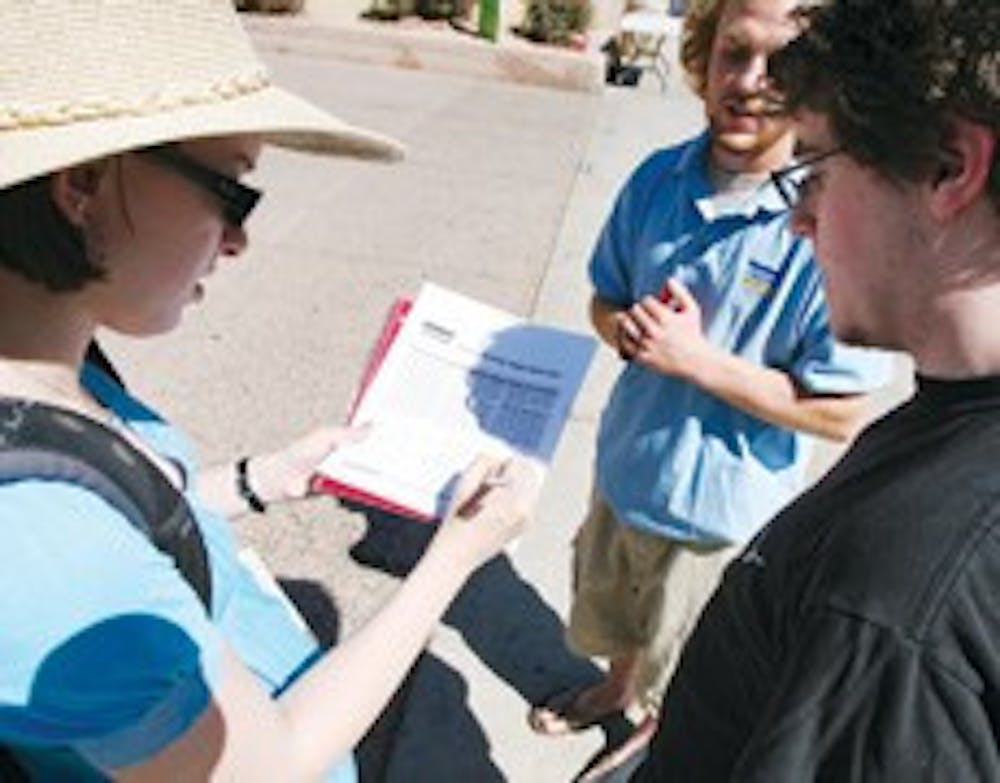The too-good-to-be-true offers students get from credit card companies probably are just that, warned one state advocacy Thursday.
Arizona Public Interest Research Group, or PIRG, stressed the importance of credit card education at both a news conference at the State Capitol in Phoenix in the morning and a table in the front of the Memorial Union in the afternoon.
Credit card vendors continue to lure students into opening credit card accounts in exchange for free gifts, which could bring students a substantial amount of debt, said Rep. Ed Ableser, D-Tempe.
Ableser is a sponsor for House Bill 2518, currently under review in House, which calls for the prohibition of credit card marketers offering gifts to people on campus in exchange for credit applications.
"We have laws protecting people from so many different social problems," Ableser said. "Yet harmful financial practices have been ignored. We want to eliminate the unwanted and unwarranted pressure to sign up for a credit card early."
Though the proposed bill would ban credit card solicitations linked to tangible gifts, marketers could still advertise special offers, low interest rates or other promotional deals, he said.
Ableser said the proposal would give students breathing room and allow them to look into credit cards on their own terms.
"We just want students to know what they're getting into," Ableser said.
Arizona PIRG conducted a survey of more than 1,500 students at 40 colleges in 14 states — called "The Campus Credit Card Trap" — to examine the effects of credit cards on student life.
According to the survey, 76 percent of the students were enticed by free gifts and stopped to consider offers or apply for credit cards. Two of three students reported they owned at least one card, while 34 percent admitted to carrying a balance month-to-month.
Jason Donofrio, a member of the Students for Arizona PIRG, said credit card companies are trying to recruit uninformed students who don't understand credit card terms and conditions of the contracts.
The anthropology sophomore said credit card companies may tweak customers billing cycles and raise interest rates without warning customers.
Phyllis Rowe, former Arizona Consumers Council president, said students must pay attention to detail when they sign credit card agreements.
"It's a big learning experience for students," Rowe said. "We need to educate them before they reach college. It's a scary thing. Some students have four to five credit cards."
The Students of Arizona PIRG launched the first part of their campaign, called FEESA in a play off of the credit card provider Visa, Thursday in front of the Memorial Union. FEESA uses the slogan, "Free gifts now, huge debt later," Donofrio said.
"The goal is to collect statements of support to say that [students] want to strengthen the policy on campus and get signatures of support," Donofrio said.
The overall campus credit-card counter-marketing campaign, "Truth about Credit," was created to increase financial education and make a difference on campus, he said.
"The main goal is to, first, educate the students to what's going on," Donofrio said. "Second, to strengthen policy to eliminate predatory tactics used by credit card companies on campuses."
Reach the reporter at: ryan.calhoun@asu.edu.




